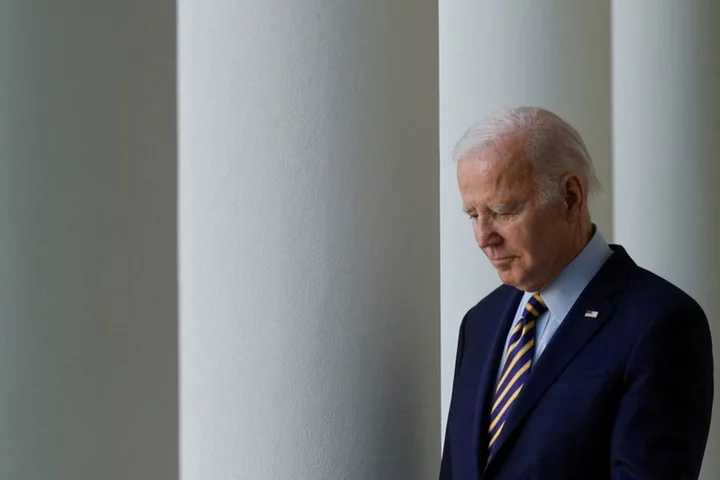By Jarrett Renshaw and Philip Blenkinsop
U.S. President Joe Biden's Inflation Reduction Act (IRA), cheered by some Democrats and the White House as a milestone in the fight against climate change, has also rankled foreign allies and global companies with its economic protectionism and prompted a new subsidy race with Europe.
Since the $739 billion in costs and revenues measure, which also tackles rising health care costs, deficit reduction and enforcement at the Internal Revenue Service, passed into law in August, the administration has issued a series of highly-watched rules on how the tax credits that power its climate investments are earned, including the Made in America requirements that upset Group of Seven (G7) leaders and global CEOs.
Here's the latest:
ELECTRIC VEHICLE FRICTION
Biden's domestic policy is embodied in working to electrify roadways across the United States. Getting more electric vehicles on the roads is central to his climate change agenda, ensuring the vehicles are "Made in America" is part of his commitment to restore manufacturing jobs.
But the IRA's consumer tax credits are tightly linked to the cars' and batteries being made in the U.S., roiling allies in Europe and Asia whose companies sell into U.S. markets.
After a feverish push by EU and Japanese leaders for Washington concessions, there seems to be a broad acceptance that the wording of the Act will not change, beyond possible flexibility on critical raw materials.
Instead, Japanese and U.S. officials struck a trade deal on electric vehicle battery minerals that expands eligibility for the $7,500 per vehicle EV tax credits in the IRA. The Biden administration is negotiating a similar agreement with the EU.
NEW RACE FOR SUBSIDIES
The promise of corporate tax credits has renewed interest in investing in the U.S., and Europe has responded with subsidies of their own.
Tesla Inc said in February that it had begun assembling batteries in Germany but will focus cell production in the United States thanks to IRA incentives, making it one of the first firms to declare a strategy shift prompted by the law.
Car makers Mercedes-Benz Group and Volkswagen-owned Audi are weighing new investments in the U.S. to take advantage of new federal subsidies, including new electric charging stations and expanding production of vehicles that qualify for U.S. tax credits.
Europe, looking for its own ways to attract domestic investment, loosened state aid rules for green industry projects in March; two electric vehicle battery makers recently announced they plan to spend around $11 billion on new factories there.
Sweden's Northvolt said it is set to pick Heide in northern Germany for its factory as long as subsidies are approved, estimated to be near $50 million. Taiwan's ProLogium announced a new plant in the French city of Dunkirk after France offered deal sweeteners and competitive power prices, executives from the company said.
PRESCRIPTION DRUG WOES
The Act allows the federal government to negotiate drug prices for its Medicare health coverage, fulfilling a campaign promise to lower drug promises for Americans.
However, some of the world’s biggest drugmakers are laying legal groundwork to fight the plan, arguing some elements of the plan are unconstitutional.
The first Medicare drug price reduction process begins in September, when the Centers for Medicare and Medicaid Services(CMS) identifies its 10 most costly drugs.
The blood thinner Eliquis from Bristol Myers Squibb (BMY.N) and Pfizer (PFE.N), Pfizer's breast cancer drug Ibrance and AbbVie's (ABBV.N) leukemia treatment Imbruvica are likely to be among 10 big-selling medicines subject to the negotiations.
SOLAR PANELS
The legislation rules offers a mix of tax credits and other incentives to try and spur clean energy plants in the United States and reduce reliance on China for the parts that power them.
Solar and wind farms can apply for a 30 percent tax credit on the costs of their plants, without any domestic requirements, for example.
But China's dominance of the global solar industry has created a tricky calculus.
The U.S. Treasury Department said earlier this month it would offer a 10 percent bonus tax credit for facilities assembling solar panels in the United States, even if they import the critical silicon wafers used to make those panels from foreign countries. Roughly 90% of the world's silicon wafers are produced in China. The move angered U.S. companies who argue it fails to do enough to combat China.
(Reporting By Jarrett Renshaw and Philip Blenkinsop; Editing by Heather Timmons and Grant McCool)

